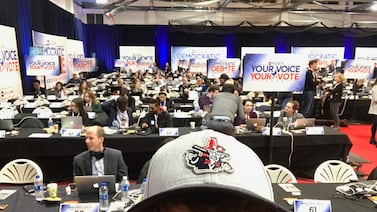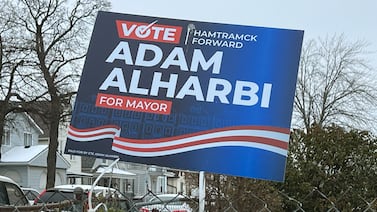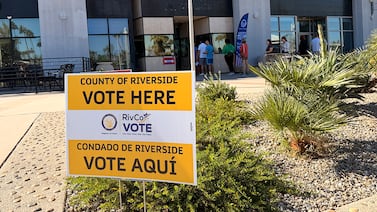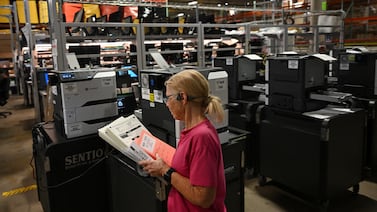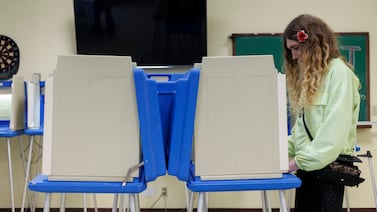This article was co-published with The Daily Beast.
A private company led by a conspiracy-minded CEO and concerned about security threats from antifa is using UV lights and assessing the “feel” of paper ballots to determine—using unclear and contradictory methodology —which votes in Maricopa County, Arizona, were supposedly fraudulently cast in November.
Never before has an election audit been conducted this way. That is why the results of the audit—ordered by the Republican majority of the state Senate, partially funded by undisclosed sources, and being conducted by an unqualified Florida firm—won’t reveal anything trustworthy about the accuracy or integrity of Arizona’s 2020 election. Rather, the partisan audit can only cause more damage to the public’s confidence in the vote.
We are not simply watching the final heaves of Donald Trump’s “stop the steal” movement. Instead, this represents a new low in the extremes American politicians will go to in order to retain power, and is a glimpse at a new way the losing party could react to its electoral defeats.
The efforts of the auditors—led by a company actually called Cyber Ninjas —would be hilarious if their hiring by Republican state senators wasn’t such a deep insult to basic democratic standards. Their typo-riddled audit procedures were kept secret until a court required them to be made public and were developed by a man the Georgia secretary of state once called a “failed inventor.”
“The purpose of this process it (sic) to collect information about the ballot paper, ballot ink and selection marks on the physical ballot during the hand recount process,” it reads, then explains that fraud can be detected by examining the folds made by voters on the ballot itself. Early absentee ballots are folded, while in-person ballots cast on election day aren’t, they claim, concluding that if a ballot cast on Election Day is folded, bang boom, it must be a fraud. But in reality, creases on a ballot don’t prove anything about their validity. Provisional ballots cast on election day, for example, are folded. And early absentee ballots may not be folded at all, especially if a voter presented at a polling location and asked for a new ballot—many voters do this after making mistakes—and cast their ballot then. That “mailed” ballot submitted in person would not be folded at all.
So Cyber Ninjas will determine hundreds of legally cast ballots are fraudulent based on creases, many of which could have happened after the vote was officially audited by hand in November by the county’s actual auditors. We don’t know how or if this group is taking these entirely reasonable creases into consideration, or distinguishing them from more maleficent folds—their extremely limited explanation of their procedures omitted such details. All this, and those UV lights they are using to find these creases degrade the paper, making it thin and yellow.
Contrast Cyber Ninjas with auditors employed by the counties and the secretary of state, who must follow legally mandated procedures for forensic examinations of ballots and are held criminally responsible if they do not. Because the Senate hastily demanded the audit through subpoena without the cooperation of the county or state, there is essentially no regulatory framework for performing such an examination. So, no such restrictions apply to these cosplaying auditors, who have been given a free pass to do what they wish. Firms hired to do audits of election hardware and ballots are generally accredited by the Election Assistance Commission or are Certified Public Accounting firms well-versed in technical specifications and audit organization. No such credentials are held by Cyber Ninjas.
For example, state law demands that only red pen—which cannot be read by tabulation machines—be used by auditors to make necessary marks on ballots or other election materials. But auditors, a local reporter named Jen Fifield found, were using blue pen, thereby contaminating the very ballots they seek to determine were cast fraudulently using folds and errant markings as incriminating evidence. When Fifield raised this violation with Cyber Ninjas’ CEO, it was clear he had no understanding of the rule. And while the auditors have routinely pledged to keep the ballots organized, clean and in the same condition they were given to them, the documentation the court has forced them to produce (after they initially refused to release anything) details scant organizational procedures and no understanding of the county’s methods.
There are also far more bizarre physical security problems. The fairgrounds outside the arena where the audit is happening also hosts—I kid you not— “Crazy Times Carnival,” which is expecting hundreds of visitors for the fried food offerings, rides and carnival games. As mentioned in a particularly detailed letter sent by Secretary of State Katie Hobbs, a Democrat, to the auditors, the ballots are frequently left accessible on the floor, and the protected ballots are surrounded by an eight-foot chain link fence with no roof, leaving them accessible to essentially anyone with the gumption to get to them. The live feed also shows that there are birds flying around the arena. Use your imagination, but those ballots aren’t returning in the same condition.
All the while, a self-styled “audit committee” has maintained a stream-of-consciousness Twitter account, which declared the audit to be “the most comprehensive forensic election audit in the history of our galaxy!”
Even the Senate Republicans’ own liaison to the audit admitted he cannot control the account nor the information it shares. “We are defining the standards of what gets tweeted out, and how do we keep that more factual based,” he said. That Twitter account is among the only windows into the shrouded way Cyber Ninjas have performed the audit, as they refused to permit access to reporters or even observers from the secretary of state’s office until a court ordered that they must be allowed. There is no set end date for this audit, which will have to pause later this month so that the event space can be used for graduations for several Phoenix high schools. Where will the 2.1 million ballots be stored to prevent them from being tampered with by any of the thousands of visitors expected in the arena? The Cyber Ninjas haven’t explained.
The only reason we know about these extraordinary details and problematic procedures is because of local reporters, who have doggedly tracked this process and forced transparency onto a process that should have been inherently transparent from the beginning. This is the core function of local journalism, and these reporters are filling that role admirably at a crucial time that is still being underplayed by national politicians. And while the audit has received consistent coverage in national outlets, local journalists know the local regulations better and simply have better access than journalists at national media do. Among the highlights of these journalists and their work:
- Jeremy Duda is providing coverage for the AZ Mirror, a nonprofit newsroom that has provided free content on this issue (and everything else!) for dozens of other news organizations. He discovered first that the head of the team hired to do the audit, Cyber Ninjas CEO Doug Logan, wrote a document of false talking points for Republican members of Congress who planned to dispute the results of the election ahead of the insurrection. It was shared by Sidney Powell. Tammy Patrick, once an elections official in Maricopa County and currently an elections expert with the Democracy Fund, called him the “canary in the coal mine, the first on the scene.” We know all that we know about this, in part, because of Jeremy’s determined work.
- Brahm Resnik, who is covering this circus for KPNX TV, has become a recognized face on TV programming across the country, keeping us updated and breaking crucial news by making this a central focus of his program “Sunday Square Off.” He, like Jeremy, has been covering this well from the beginning.
- Jen Fifield is reporting for the Arizona Republic, and her discovery of the use of blue pens spurred the hashtag #BluePenJen. Her reporting was central to initially determining how out of whack this audit was with normal standards, and her work fighting for transparency radically increased public awareness.
- Nicole Valdes and Garrett Archer at ABC 15 broke the story on Tuesday that volunteer auditors were being forced to sign nondisclosure agreements as a condition of their work. They have been tenaciously covering all of the ins and outs of the lawsuits and controversies over this nuanced issue, which is often hard to do in TV format.
It is unprecedented state issues such as this that prove the value of local journalism. Not only in covering ongoing events, but by actively uncovering malfeasance and wrongdoing and forcing light into rooms that were intentionally darkened. These journalists, and a dozen others, are a necessary part of an informed electorate and a functioning democracy.
Their coverage points to an alarming future: that partisan audits may become the norm in elections, a new tool in the toolkit alongside overly strict voter ID laws, shrinking numbers of polling places, insidious gerrymandering and objectively racist voting laws used to keep power even when the electorate chooses to take it away.
Washington Secretary of State Kym Wyman, a Republican, expressed grave concern about the future of her own party at a panel hosted by the National Taskforce on Election Crises this week. “Trump suppressed his own voters” in 2020 with his rhetoric around mailed ballots and his distrust of the system, she said. This audit only furthers that skepticism.
“I don’t know how the Republican Party realigns if it continues down this path.” said Matt Masterson, a Republican who is the former head of election security for the Cybersecurity and Infrastructure Security Agency. While Russia, China and Iran pursued intense misinformation campaigns aimed at undermining Americans’ confidence in the election, Masterson said they are all sitting back and “watching us do it to ourselves.”
Trump, in media appearances from Mar-a-Lago this week, has praised the audit and hinted he may call for more, portraying it to a crowd there as his roadmap back to Pennsylvania Avenue. “I think it’s going to be incredible. I think it’s going to be eye-opening,” Trump said last week on Dan Bongino’s podcast. “Because I have no question we won Arizona. We had rallies, we had such enthusiasm like nobody’s ever seen anything like it. And then all of a sudden, we lose. People couldn’t believe it.”
Rallies, of course, don’t confirm whose ballots were validly cast and accurately counted. Official, nonpartisan auditors do. But Trump’s anti-election allies have found a way to try to subvert the authority of the election audit system, by replacing it with an extralegal process where an unqualified company run by a conspiracy theorist is handling and making determinations about the legitimacy of ballots. If the partisan audit ends up delegitimizing Arizona’s election results, the strategy could catch on, unless Americans—informed by vigilant local reporting—see through these undemocratic maneuvers.


